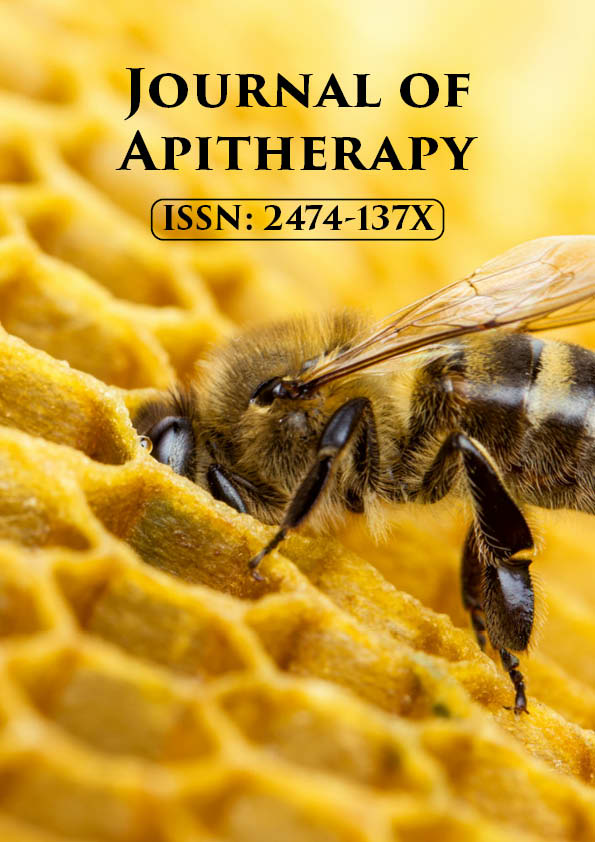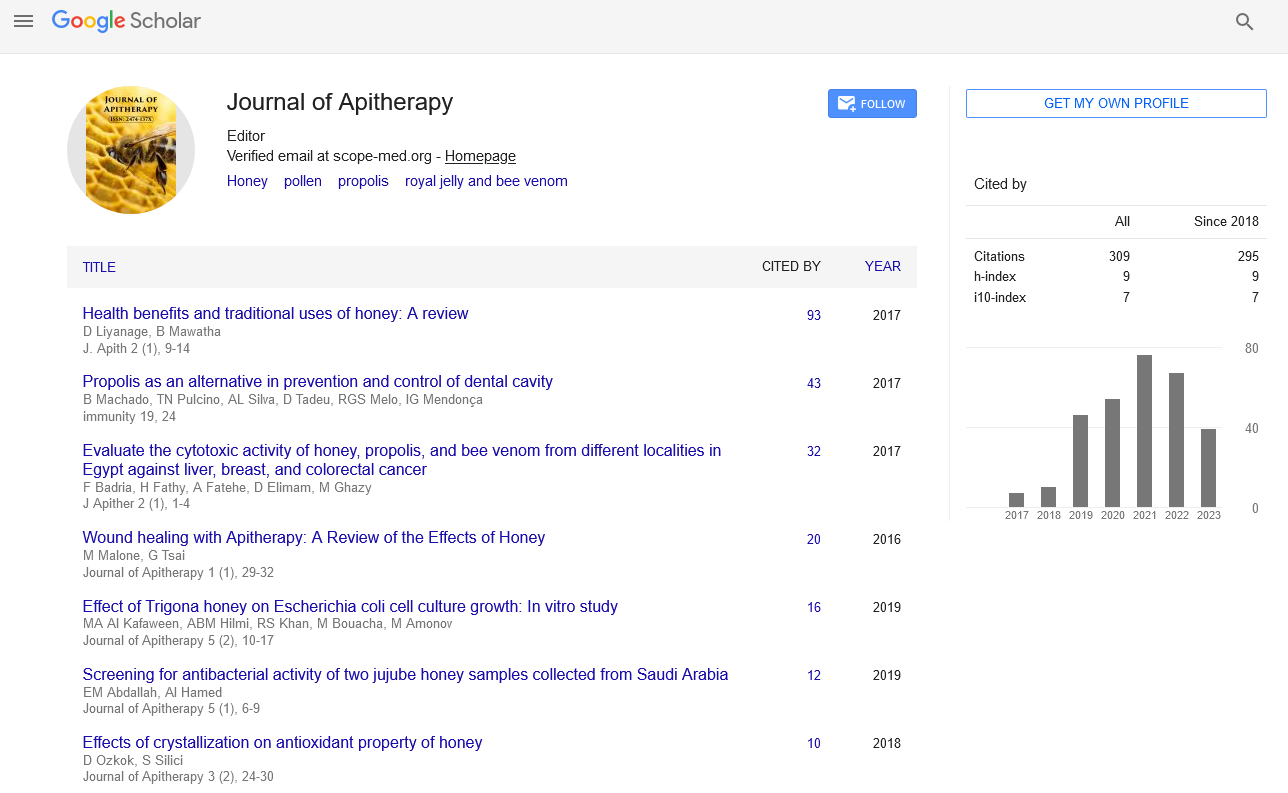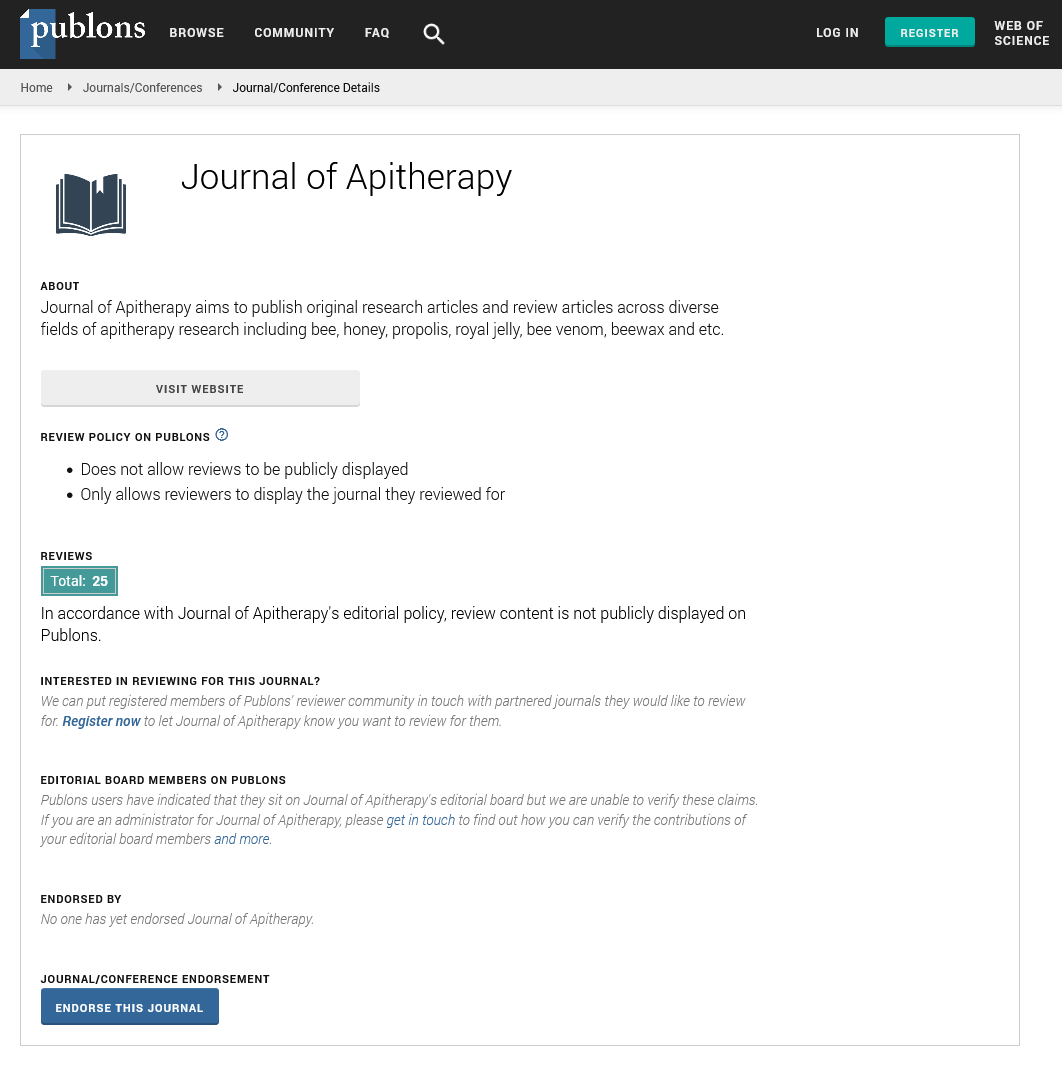Opinion Article - Journal of Apitherapy (2023)
The Science of Bee Bread Probiotics and Their Impact on Well-Being
Carlos A Marcello*Carlos A Marcello, Department of Apitherapy, University of Washington, Seattle, USA, Email: carlos@gmail.com
Received: 03-Aug-2023, Manuscript No. JAPITHERAPY-23-112571; Editor assigned: 07-Aug-2023, Pre QC No. JAPITHERAPY-23-112571(PQ); Reviewed: 21-Aug-2023, QC No. JAPITHERAPY-23-112571; Revised: 28-Aug-2023, Manuscript No. JAPITHERAPY-23-112571(R); Published: 04-Sep-2023
Description
In a world dominated by modern pharmaceuticals and synthetic health supplements, nature often provides us with hidden treasures that have been used for centuries. One such marvel is bee bread, a natural probiotic packed with nutrients and health benefits. Bee bread is a product of the industrious honeybee and has gained recognition for its potential to enhance our overall well-being. In this article, we will delve into the fascinating world of bee bread probiotics, exploring their origins, composition, and the numerous ways they can positively impact human health.
The origin of bee bread
Bee bread, often referred to as "ambrosia," is a concoction created by honeybees within their hives. It is not to be confused with pollen, which is the primary source of protein for bees. The process of transforming pollen into bee bread is intricate and involves fermentation and enzymatic activity carried out by the bees themselves. Here's how it happens:
Pollen collection: Worker bees collect pollen from a variety of flowers as their primary source of protein. They transport this pollen back to the hive in specialized baskets on their hind legs.
Fermentation: Once inside the hive, the collected pollen is mixed with nectar and bee saliva. This mixture undergoes fermentation facilitated by the enzymes produced by the bees. This process helps break down the tough outer shell of pollen grains and enhances its digestibility [1].
Storage: The resulting mixture is then stored in cells within the hive, where it continues to ferment. Over time, this blend transforms into bee bread.
Nutrient enrichment: As the bee bread matures, it becomes enriched with beneficial microorganisms, enzymes, vitamins, and minerals, making it a potent health supplement.
Composition of bee bread probiotics
Bee bread is a nutritional powerhouse, and its composition reflects the remarkable transformation it undergoes within the hive. Here is a breakdown of the key components found in bee bread:
Probiotic microorganisms: One of the standout features of bee bread is its high content of beneficial microorganisms, such as Lactic Acid bacteria (LAB) and yeasts. These probiotics play a crucial role in gut health, aiding digestion, and promoting a balanced microbial environment in the intestines [2].
Nutrients and minerals: Bee bread is rich in vitamins and minerals, including B vitamins (B1, B2, B6), vitamin C, vitamin E, calcium, magnesium, and iron. These nutrients are essential for various bodily functions, including energy metabolism and immune system support [3].
Antioxidants: With its high levels of flavonoids and phenolic compounds, bee bread possesses antioxidant properties. Antioxidants help combat oxidative stress and reduce the risk of chronic diseases.
Protein and amino acids: Bee bread is a source of high-quality protein and contains all essential amino acids, making it a valuable addition to vegetarian and vegan diets.
Enzymes: Enzymes present in bee bread aid in the digestion of food and the absorption of nutrients, potentially alleviating digestive issues.
Fiber: The fiber content in bee bread supports healthy digestion and can help regulate bowel movements.
Health benefits of bee bread probiotics
The diverse composition of bee bread provides numerous health benefits:
Gut health: The probiotic microorganisms in bee bread contribute to a healthy gut microbiome, promoting digestion and nutrient absorption. A balanced gut microbiota is associated with improved immune function and reduced risk of gastrointestinal disorders [4].
Immune system support: The vitamins, minerals, and antioxidants in bee bread boost the immune system, helping the body defend against infections and illnesses.
Energy and vitality: Bee bread's rich nutrient profile provides a natural energy boost, making it an excellent choice for athletes and those seeking increased vitality.
Allergies: Some individuals have reported that consuming bee bread may help reduce allergic reactions to pollen, although more research is needed in this area [5].
Anti-inflammatory effects: The antioxidants in bee bread have anti-inflammatory properties, potentially alleviating chronic inflammation linked to various health conditions.
Skin health: Topical applications of bee bread have been explored for their potential to soothe and nourish the skin [6].
How to incorporate bee bread into your diet
Adding bee bread to your daily diet is a simple and effective way to harness its potential health benefits. Here are some ideas on how to incorporate bee bread into your meals:
Bee bread smoothie: Blend a teaspoon of bee bread into your morning smoothie for a nutrient-packed start to the day.
Bee bread salad: Sprinkle bee bread over your salads to add a crunchy, nutritious twist to your greens.
Bee bread yogurt: Mix bee bread into yogurt for a probiotic-rich snack.
Bee bread honey spread: Create a delicious spread by mixing bee bread with honey or nut butter.
Bee bread tea: Steep bee bread in hot water to create a nourishing herbal tea.
How to incorporate bee bread into your diet
Adding bee bread to your daily diet is a simple and
A note of caution
While bee bread offers a plethora of health benefits, it's essential to ensure that you are not allergic to bee products before incorporating it into your diet. If you have a known bee allergy, consult with a healthcare professional before consuming bee bread. Bee bread probiotics represent a natural and wholesome approach to enhancing health and well-being. With its unique composition of probiotics, nutrients, antioxidants, and enzymes, bee bread has the potential to support digestive health, boost the immune system, increase energy levels, and offer a wide range of other health benefits. As interest in natural remedies continues to grow, bee bread stands as a testament to the remarkable synergy between nature and human health. By incorporating bee bread into our diets, we can tap into the wisdom of these tiny pollinators and enjoy the benefits of this ancient elixir for generations to come[7].
References
- Ghosh S, Namin SM, Jung C. Differential bacterial community of bee bread and bee pollen revealed by 16s rRNA high-throughput sequencing. Insects 2022;13:863.
[Crossref] [Google Scholar] [pubmed]
- Wei J, Fei Z, Pan G, Weiss LM, Zhou Z. Current therapy and therapeutic targets for microsporidiosis. Front Microbiol 2022;9:835390.
[Crossref] [Google scholar] [pubmed]
- Sugiharto S. Dietary strategies to alleviate high-stocking-density-induced stress in broiler chickens - a comprehensive review. Arch Anim Breed 2022; 21:21-36.
[Crossref] [Google Scholar] [pubmed]
- Zhao Y, An J, Su H, Li B, Liang D, Huang C. Antimicrobial food packaging integrating polysaccharide-based substrates with green antimicrobial agents: A sustainable path. Food Res Int 2022;155:111096.
[Crossref] [Google scholar] [pubmed]
- Toutiaee S, Mojgani N, Harzandi N, Moharrami M, Mokhberosafa L. In vitro probiotic and safety attributes of Bacillus spp. isolated from beebread, honey samples and digestive tract of honeybees Apis mellifera. Lett Appl Microbiol 2022;74:656-665.
[Crossref] [Google scholar] [pubmed]
- Gunes-Bayir A, Bilgin MG, Guclu D, Pogda S, Dadak A. Preparation and evaluation of novel functional fermented dairy products containing propolis and cinnamon. J Food Sci Technol 2022; 59: 2392-2401.
[Crossref] [Google scholar] [pubmed]
- Park J, Kim YJ, Suh SH, Kim MG, Kwak HS, Kim SH, Heo EJ. Evaluation of hygiene indicators and sampling plan for detecting microbial contamination in health functional foods. J Food Prot 2022; 85:844-848.
[Crossref] [Google scholar] [pubmed]







